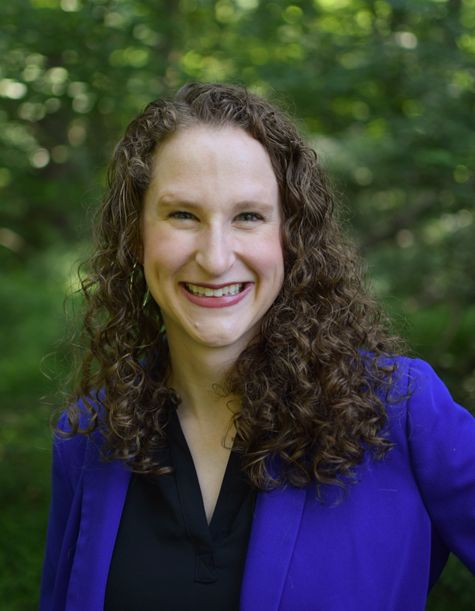Early Career Scientist Spotlight
Dr. Sarah Valencia (she/her/hers)
Lunar Petrologist
Planetary Geology, Geophysics and Geochemistry Laboratory (698)
What is your research focus?
I’m interested in the “weird” rocks that are found on the Moon, meaning those rocks that either form in ways completely different than their counterparts found on Earth, or the rock types that do not occur on Earth at all. I study the chemistry and formation of lunar rocks both by looking at samples and by remote sensing.
For my sample work, I use electron probe microscopy to analyze the chemistry and textures of lunar rocks from the Apollo sample collection and lunar meteorites. Understanding the chemistry of lunar rocks tells us about how they formed and how the composition of the lunar interior evolved over time.
Similarly, my remote sensing work focuses on understanding the composition and formation of rocks on the surface of the Moon. To do so, I use data obtained by satellites in orbit around the Moon to study the surface textures and chemistry of the lunar surface.
Did you always know that you wanted to be a lunar petrologist?
I’ve known since I was a young kid that I wanted to study space, and I was always particularly interested in the Moon. I was fascinated by the Apollo program and wanted to be a part of the future of lunar missions. It wasn’t until college, however, that I found my way to geology after I took an introduction to geology class in the Teton Mountains in Wyoming and decided that was the career path I wanted to take to study the Moon.

Credit: unknown
What aspect of your work excites you the most?
Looking forward to future missions. I love to take my understanding of the chemistry of lunar rocks to help plan the science goals for the next generation of instruments and missions to the Moon. With both human and robotic missions to the Moon planned for the near-term, it’s an exciting time to be a lunar scientist!
The other part of my job that I really enjoy is doing is community outreach events. Sharing my love of the Moon and engaging the public in the science that happens at NASA is very rewarding. I especially love working with K-12 students and hearing the amazing questions they have for scientists!

Credit: NASA GSFC/Staci Tiedeken/Andrea Jones
What is one research project that you are particularly excited about, and why?
I’m really excited about the formation of granitic rocks under lunar conditions. On Earth, granite is plentiful because its formation is aided by plate tectonics and water. But the Moon lacks both of those things. One aspect of my research is to try to understand how granitic rocks form under lunar conditions. I find this work really exciting because it’s one of the outstanding questions about the formation of lunar rocks. We have very little granite in the lunar sample collection, and we’ve never visited an outcrop of this rock type on the lunar surface, so many questions remain.
If you were to expand your current research focus, what new topic(s) would you explore?
Most of my research on granitic lunar rocks is based on samples returned during the Apollo program. However, I’m interested in expanding this research to explore what we can learn about granitic rocks from remote sensing assets, e.g., the chemistry and surface textures of granitic rocks on the lunar surface. It’s so important to study lunar rocks both at the sample and outcrop scales because both are needed to understand the formation history of the samples. This is particularly relevant when studying granitic rocks because the formation mechanisms are so enigmatic. Formation mechanisms of granite that we see on the sample scale may not apply to the large-scale granitic rock constructs we see on the Moon.

Credit: NASA GSFC/Molly Wasser
What early career advice do you have for those looking to do what you do?
First, find a group of fellow scientists at a similar career stage to form a support network. Having a group of trusted colleagues to bounce ideas off of and who can provide moral support is so helpful as an early career scientist learning to navigate in the planetary sciences field. A small group like this is also invaluable for networking in the field as you have a group of folks looking out for each other’s best interests and supporting each other.
Second, get involved as much as possible! There are so many ways to get involved in planetary science, including internships, science communication and outreach opportunities, and professional societies. Find ways to get involved early and meet others in the field to build relationships that will open doors.
Third, find a good work-life balance. It’s hard when there is exciting science to be done, and there is enormous pressure to publish as much as possible. But burnout is a real problem in science, so finding a good-work life balance early in your career is critical.
Lastly, take up computer programming before you think you’ll need to know how! It is becoming increasingly important in planetary science to be proficient in at least one programming language.

Credit: Ryan Watkins
What is a fun fact about you?
I love to garden. In particular, I’m passionate about native plant gardening. I have ever expanding gardens full of plants native to Maryland that I’ve enjoyed watching develop over the last few years.
Biography
Home Town:
South Lyon, MI
Undergraduate Degree:
B.S. Geological Science, University of Michigan, Ann Arbor, MI
Post-graduate Degrees:
M.A., Ph.D., Earth and Planetary Science, Washington University in St. Louis, St. Louis, MO

Link to Dr. Valencia's GSFC Bio
